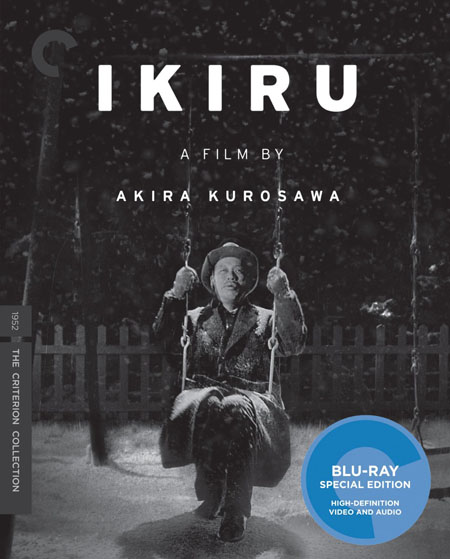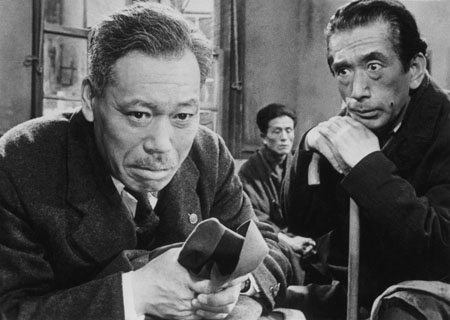
“JAPAN’S UNSUNG
ACTING GENIUSâ€
By Raymond Benson
The
works of famed director Akira Kurosawa are mostly associated with the samurai
film—pictures set in the time of feudal Japan, and usually starring the
brilliant actor Toshiro Mifune (Rashomon,
Seven Samurai, Throne of Blood, The Hidden
Fortress, Yojimbo, among others).
However, Kurosawa made other kinds of movies that are probably not as well
known in the West except to film historians and true cinephiles—and fans of the
excellent DVD and Blu-ray label, The Criterion Collection. Some of Kurosawa’s
early work was made up of film noir gangster
and crime pictures (e.g., Drunken Angel,
Stray Dog, The Bad Sleep Well), but also, surprisingly, heartfelt social
dramas set in contemporary Japan—about ordinary people. Ikiru is one of the latter, and it’s a movie that Roger Ebert once
called Kurosawa’s “greatest film.â€
Ikiru is set in Tokyo in
the early fifties. Kanji Watanabe (played by the wonderful Takashi Shimura) is
a middle-aged bureaucrat in City Hall, the chief of “Public Works.†He has
spent the last thirty years behind a desk, stamping endless pieces of paper
with his little seal, never causing trouble, and pawning off problems to other
departments, which, in turn, direct them to yet more departments. Bureaucracy
at its dullest and most inefficient. At the beginning of the story, several
women bring in a complaint about a mosquito-infested cesspool in the middle of
their district that should be covered or turned into a park or whatever. But no
one at City Hall wants to accept the responsibility of doing anything about it,
including Watanabe, and even the egotistical mayor.
Contributing
to Watanabe’s stagnation are the attitudes of his grown son and his wife, who
live with him in the same house. All they’re waiting for is the inheritance
that will one day come their way (Watanabe’s wife is long dead). Then the
ultimate insult occurs—Watanabe discovers he has stomach cancer and has six
months to live. After the initial shock and depression, the news inspires him
to undergo a drastic change.
Watanabe
suddenly wants to make something of his life while there’s still time. He
befriends a young female subordinate and attempts to experience Tokyo’s
nightlife, but that doesn’t satisfy him. Finally, he embarks on taking it upon
himself to do something about that cesspool and turn it into a children’s
playground before he dies.

But
there is more going on in Kurosawa’s film—the director has something to say that
is universal regarding a) government bureaucracy; b) working for years in a job
that provides no pleasure; c) gossip among co-workers and family about things
for which they don’t bother to learn the truth; d) the medical profession’s
reluctance to tell a patient the hard facts; e) and, finally, how important it
is to find something in one’s life that is fulfilling. Ikiru means “to live†in Japanese.
This
brings me to the lead actor, Takashi Shimura. While Toshiro Mifune usually gets
all the accolades of being “Japan’s greatest actor†etc. etc., and while I
don’t begrudge Mifune-san this praise, I believe Shimura-san had a longer,
deeper, and more varied career as an actor. If you’ve seen Rashomon or Seven Samurai,
then you know who he is—Shimura played the leader of the seven samurai, and he
was the woodcutter in Rashomon. In
fact, Shimura, was in twenty-one of Kurosawa’s thirty films (Mifune was in
sixteen). Shimura also appeared in Gojira
(Godzilla, 1954, and its American
cut, Godzilla—King of the Monsters,
1956) in a major role of a paleontologist. The actor appeared in several other
Toho Studios monster movies released worldwide. In fact, Shimura was in over
200 films between 1934 and 1981 (he died in 1982 at the age of 76). Than man
was a genius. One only has to compare the actor’s performances in both Ikiru and Seven Samurai to appreciate the diversity this talented actor
possessed. Takashi Shimura is Japan’s greatest unsung cinema thespian.
Criterion
has re-issued Ikiru with a new, very
good-looking restored 4K digital transfer, with uncompressed monaural
soundtrack. There is an audio commentary from 2003 by Stephen Prince, author of
The Warrior’s Camera: The Cinema of Akira
Kurosawa. Supplements include a 90-minute documentary from 2000 about
Kurosawa that features interviews with the director; a lengthy documentary from
2003 on Ikiru featuring interviews
with Kurosawa, one of the script writers, other members of the crew, and
Takashi Shimura. There’s a new English subtitle translation, and the obligatory
trailer. An essay by critic and travel writer Pico Iyer and a reprint from
critic Donald Richie’s book The Films of
Akira Kurosawa are included in the booklet.
Ikiru is a movie about
humanity, life, and death, and it’s perhaps Kurosawa’s most personal film. That
means it’s a must for connoisseurs of foreign cinema.
CLICK HERE TO ORDER FROM AMAZON
